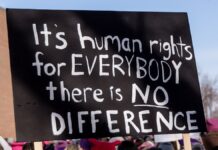“Growing up, we were told that people with albinism are different from us and the common perception was that they don’t die, they disappear,” Nomsa Zondo tells The Daily Vox as she sweeps the small yard in front of her home. She says that many people in her community still believe myths and misconceptions like these about albinism.
Her three grandchildren are playing around the modest home in Lindelani Township, KwaZulu Natal. Here, people with albinism have been living in fear since the horrific killing of 20-year-old Thandazile Mpunzi, in Manguzi, north of the province in August 2015. Mpunzi was killed by three men and her body was later found dismembered and buried in a shallow grave.
Several people with albinism have gone missing on the north coast of KwaZulu Natal since then. Just last month, the body of Asanda Mbuyazi, a 19-year-old woman from Richards Bay, was recovered with multiple stab wounds after she went missing from her home the previous week.
Albinism is an inherited condition that reduces the amount of melanin pigment formed in the skin, hair and eyes. People with albinism have fair hair and skin, light-coloured eyes, and are susceptible to sunburn and skin cancer. They also often have problems with their eyesight.
But in KwaZulu Natal many people still hold cultural beliefs about the condition. The use of natural remedies including medicinal herbs as a holistic treatment for albinism is still prevalent. And there are also those who believe albinism is the result of black magic.
More dangerous is the belief that the body parts of a person with albinism – their hands, feet, ears, nose, and genitals – bring wealth and good luck when mixed with muti. This is believed to be the reason why Thandazile Mpunzi was killed and dismembered.
Kwenzekile Dlamini, also from Lindelani Township, says the kids with albinism who she grew up with were mocked and called names.
“People are still called derogatory terms such as isishawa [albino]. In black communities, people don’t really know what albinism is,” she said.
Simisokuhle Mntungwa has albinism. The 22-year-old law student speaks openly about his condition and his upbringing in the Mophela area of Hammarsdale, west of KwaZulu-Natal.
“It’s sad that people are not informed about albinism. You find that some of them are unable to even talk about it. All the perceptions about albinism will remain if we go on like this,” he said.
Mntungwa says the lack of education about albinism plays a role in how people with albinism are perceived, but says poverty also has a huge influence.
“People are hungry and would do anything for survival, but there are also certain beliefs and greed,” he added.
Tshepo Mofokeng, a traditional healer from Matatiele, Eastern Cape, agrees. Mofokeng sells herbs and traditional medicine from a small rented hut at Victoria Street market, the home of traditional herbs in Durban. He says there’s a market for muti made with the body parts of people with albinism, particularly among those in search of quick wealth and power.
“People have approached me seeking magic powers and wealth but I have referred them to other healers because I don’t deal with witchcraft. There are healers who are involved in this whole charade but I don’t believe it works.”
Government says it is working with schools and police to educate people, but each new murder of a person with albinism shows these beliefs aren’t so easy to eradicate.








